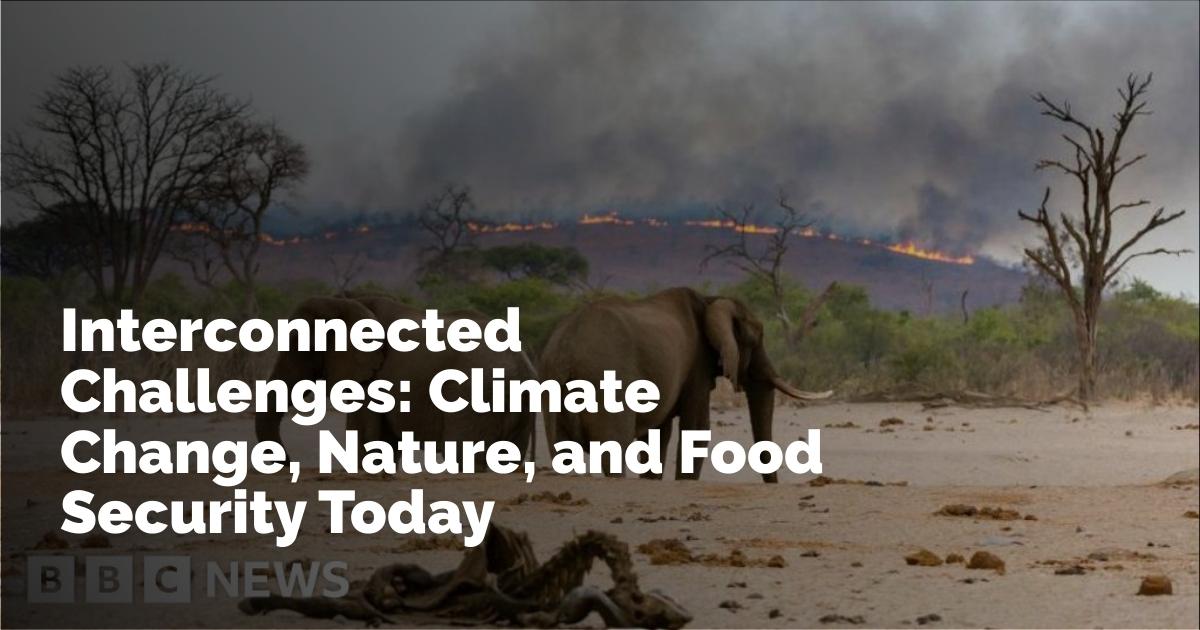Major Report Connects the Dots Between Global Nature Challenges
Climate change, nature loss, and food insecurity are problems plaguing the world, and they are more interconnected than previously acknowledged. According to a new report from the Intergovernmental Platform on Biodiversity and Ecosystem Services (IPBES), addressing these issues as separate entities is proving ineffective. This comprehensive review of scientific evidence highlights that governments often underestimate or ignore the critical links between five essential areas: biodiversity, water, food, health, and climate change.
A Flawed Siloed Approach
One of the primary criticisms leveled by the report is the fragmented and siloed approach that currently governs how these interconnected challenges are addressed. The report cautions that such a narrow view can yield unforeseen negative consequences. For instance, initiatives aimed at increasing food production may inadvertently result in river pollution, while certain tree-planting schemes, meant to combat climate change, could end up harming biodiversity.
This essential assessment was ratified by nearly 150 countries in a meeting held in Windhoek, Namibia. The interconnectedness between these crucial areas is pivotal in managing the crises impacting the natural world, emphasizes Paula Harrison, the co-chair of the report and a professor of land and water modeling at the UK Centre for Ecology & Hydrology. Harrison highlights that governance systems tend to be compartmentalized: "They're working in silos, they're very fragmented… and that means you can get unintended consequences or trade-offs."
A Holistic Remedy: Low-Cost Solutions
To confront these intertwined challenges, the report outlines over 70 solutions, many of which are cost-effective. A striking example given in the report discusses the disease bilharzia, which affects more than 200 million people globally, predominantly in Africa. Traditional approaches treating bilharzia as a health issue through medication often result in reinfection. Conversely, in rural Senegal, efforts to manage water pollution and target invasive plants—habitats for the snails that host the disease-causing parasitic worms—yielded improvements in both health and biodiversity.
Economic Neglect: The High Costs of Inaction
The report, co-chaired by Prof. Pamela McElwee of Rutgers University, further warns against the prioritization of short-term financial returns at nature's expense. It suggests that the unaccounted costs of prevalent economic activities—impacting biodiversity, water, health, climate change—are staggeringly high, reaching up to $10-25 trillion annually. These findings underscore an urgent need for reevaluation.
Disturbing Findings: Human Impact on the Planet
More than half of the world's population, particularly in developing nations, is already grappling with severe impacts from declining biodiversity, water, and food resources. Biodiversity, defined as the richness and variety of life on Earth, is universally in decline, primarily due to human actions. The consequences reflect direly upon food security, nutrition, water, health, well-being, and resilience against climate change.
The Costs of Delay
The report finds that procrastination in meeting policy goals exponentially magnifies delivery costs. For instance, delaying action on biodiversity goals could double expenses and elevate the risk of species extinctions, hampering future sustainability.
The Future Under Current Trends
Examining upcoming challenges and scenarios through to the years 2050 and 2100, the report predicts dire outcomes. Under the current "business as usual" trends, biodiversity, water quality, and human health are set to worsen. Addressing each issue in isolation will potentially result in adverse effects elsewhere. For example, focusing solely on climate change can have negative repercussions for biodiversity and food due to land competition.
Navigating Towards a Positive Future
However, the report does not merely outline the challenges—it envisions future scenarios with potential positive outcomes for both people and nature. Prof. Harrison points out, "Future scenarios with the widest nexus benefits are those that focus on sustainable production and consumption, combined with conserving and restoring ecosystems, reducing pollution, and mitigating and adapting to climate change."
A Global Call to Action
The IPBES parallels the IPCC in its role as the UN's go-to body for providing policymakers with scientific assessments about global biodiversity and ecological contributions. These insights are vital for crafting informed and effective environmental policies. As these interconnected challenges demand urgent attention, the report underscores the necessity for holistic and integrated approaches that acknowledge the complex interplay between climate, ecology, and human impact. The time to act in harmony with nature's symphony has never been so pressing.
출처 : Original Source

